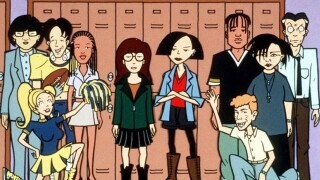4 Sitcoms That Explain the 90s

Just because your aunt had a Rachel haircut in the 1990s doesn’t mean Friends can tell you a damn thing about the decade. In fact, Friends was anti-1990s by design. Bear with us here.
Friends played “against the concept of Generation X,” says series co-creator Marta Kauffman. “Their clothes are clean, unlike Ethan Hawke, who wore the dirtiest things in Reality Bites.” Kauffman and the show’s producers were going after something more timeless, a show that could be enjoyed by any generation of twenty-somethings trying to make their way in the world. (Whether that’s working for you probably has something to do with how much you hate Ross Geller.)

Universal Pictures
Don't Miss
If you really want to know about the 1990s, there are a lot of TV comedies that explain it better than Friends. Like these four, for example.
Daria
The cast of Friends also wouldn’t dress like Daria, who did most of her shopping at Can’t Be Bothered & Co. From the grunge-guitar crunch of its theme song to Daria’s deadpan fatalism, the animated Beavis and Butthead spinoff embodied the world-weary indifference of many 90s teens. To watch Daria was to shrug, sigh, and resign oneself to fate.
“Daria is wholly reflective of the era of its creation – the 90s, when even advertisements were presented with tongues firmly planted in cheek,” says The Guardian, noting that its depiction of abject teen angst was absolutely true. Even Daria and friends’ killer jokes reflect the era, thrown about “solely in order to create protective armor around themselves in a hostile world.”
Seinfeld
In The Nineties, Chuck Klosterman calls Seinfeld “the most popular, most transformative live-action show on television.” It threw out sitcoms’ traditional wacky mix-ups and embraced banality. “Everyone’s doing something,” George explains. “We’ll do nothing!” And what could be more slacker 90s than doing nothing?
Like Pulp Fiction, Scream, and other 90s pop culture, Seinfeld jumped on the meta train, with Jerry and Larry David creating fictional versions of themselves creating fictional versions of themselves. That sensibility reflected a decade that was always one step removed from itself.
The show also rejected show biz sentimentality, making it a spiritual cousin of Daria. Larry David’s mantra of “no hugging, no learning” would have been embraced … well, nodded at, by Daria herself. If the 90s were a time of disaffected disconnection, Seinfeld led the charge.
Mr. Show
Yeah yeah yeah, Mr. Show isn’t a sitcom. But it embraced what was happening in the 1990s comedy scene more than any other show.
Mr. Show was defined primarily by the 90s alt-comedy movement, a reaction to the microphone-in-front-of-a-brick-wall comics of the 1980s. It “grew out of these guys who were writing on sketch shows for years, and these are the sketches they wanted to get on the air that never did,” says Patton Oswalt. “Mr. Show is a being-young-in-the-’90s thing.”
Bob Odenkirk’s frustrating tenure as a writer on Saturday Night Live pushed him and David Cross to produce an anti-SNL, with few recurring characters, interlaced narratives, and its own version of the meta-comedy playing out on Seinfeld. “Fans in the know would pass around videotapes of Mr. Show like a forbidden treasure,” notes NPR -- and those fans, like Tim Heidecker and Eric Wareheim, would build the next generation of sketch comedy.
The Larry Sanders Show
Want to know what it was like to work in show business in the 1990s? Larry Sanders was practically a documentary.
Never before had the curtain been pulled back on the miserable insecurities of the people who make us laugh. But not just any funny people -- the world of Larry Sanders could have only existed in the 1990s, when late-night comedy wars were the subjects of best-selling books and made-for-TV movies. There were real battles between shows over who would book the biggest stars. And the hosts themselves jostled to see who would replace Carson as the King of Late Night. (Later, they would find the answer to be “none of them.”)
Leave aside the fact that Sanders is one of the funniest, most human shows ever. It has a lot to tell us about a changing culture in which entertainment would fragment forever.
For more ComedyNerd, be sure to check out:
We Roast Decades Worth of Comedy Roasts
Seinfeld: 15 Kramer Schemes, Ranked
Saturday Night Live: A Ridiculously Thorough Breakdown Of Season 47
For ComedyNerd exclusive content and more, subscribe to our fancy newsletter:
Top image: Heyday Media
